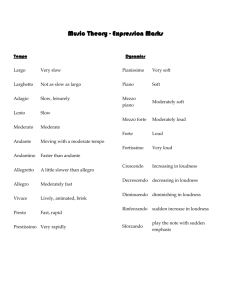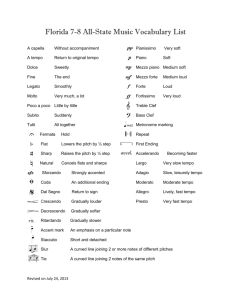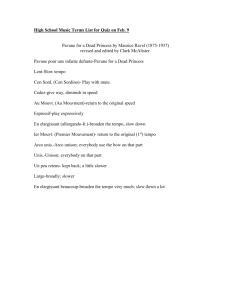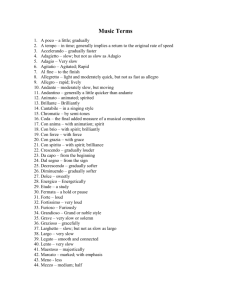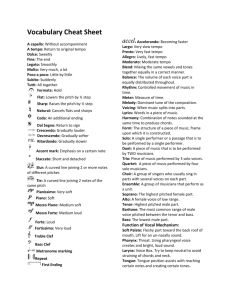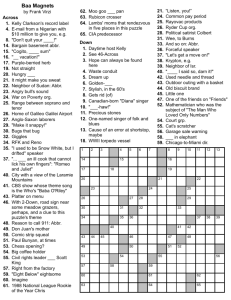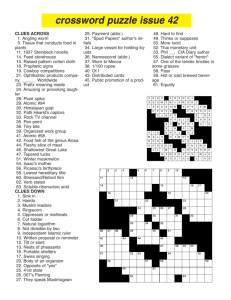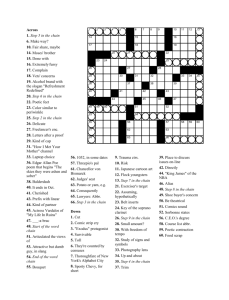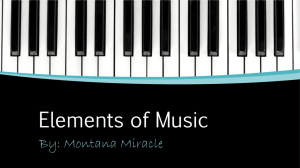Music Terminology music_terms_with_definitions
advertisement
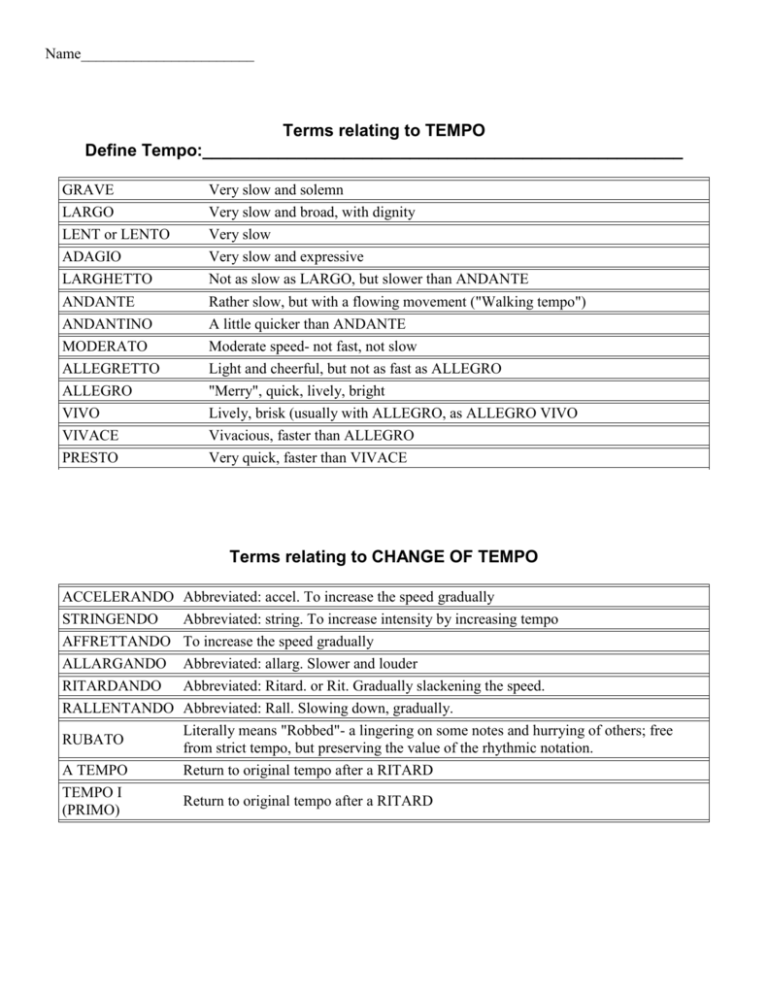
Name_______________________
Terms relating to TEMPO
Define Tempo:___________________________________________________
GRAVE
LARGO
LENT or LENTO
ADAGIO
LARGHETTO
ANDANTE
ANDANTINO
MODERATO
ALLEGRETTO
ALLEGRO
VIVO
VIVACE
PRESTO
Very slow and solemn
Very slow and broad, with dignity
Very slow
Very slow and expressive
Not as slow as LARGO, but slower than ANDANTE
Rather slow, but with a flowing movement ("Walking tempo")
A little quicker than ANDANTE
Moderate speed- not fast, not slow
Light and cheerful, but not as fast as ALLEGRO
"Merry", quick, lively, bright
Lively, brisk (usually with ALLEGRO, as ALLEGRO VIVO
Vivacious, faster than ALLEGRO
Very quick, faster than VIVACE
Terms relating to CHANGE OF TEMPO
ACCELERANDO
STRINGENDO
AFFRETTANDO
ALLARGANDO
RITARDANDO
RALLENTANDO
RUBATO
A TEMPO
TEMPO I
(PRIMO)
Abbreviated: accel. To increase the speed gradually
Abbreviated: string. To increase intensity by increasing tempo
To increase the speed gradually
Abbreviated: allarg. Slower and louder
Abbreviated: Ritard. or Rit. Gradually slackening the speed.
Abbreviated: Rall. Slowing down, gradually.
Literally means "Robbed"- a lingering on some notes and hurrying of others; free
from strict tempo, but preserving the value of the rhythmic notation.
Return to original tempo after a RITARD
Return to original tempo after a RITARD
Name_______________________
Words that often accompany TEMPO Markings
MOLTO
MENO
PIU
NON
TROPPO
POCO A
POCO
Very much; e.g., MOLTO RITARD means to slow down exceedingly
Less; e.g., MENO MOSSO means less fast (slower)
More
Not too much, e.g., ALLEGRO NON TROPPO means fast, but not too fast
literally "little by little". Used in combination with tempo markings. e.g., ACCEL. POCO A
POCO means to increase the speed gradually over a span of measures.
Terms relating to DYNAMICS (from soft to loud)
Define Dynamics:______________________________________________________
PIANISSIMO
PIANO
MEZZO
MEZZO
PIANO
MEZZO
FORTE
FORTE
FORTISSIMO
DIMINUENDO
CRESCENDO
(abbr: pp). Very soft
(abbr: p). Soft
Medium or moderately
(abbr: mp). Medium soft
(abbr: mf). Moderately loud
(abbr: f). Loud
(abbr: ff) Very loud
(abbr: dim.) or the sign
means gradually getting softer
(abbr: cresc.) or the sign
means gradually getting louder
"Little by little". Indicates a gradual increase or decrease in volume of sound; e.g.,
POCO A POCO
CRESC> POCO A POCO means to increase the volume gradually.
ACCENT
A stress on notes so marked
SFORZANDO (abbr: sfz) A strongly accented note or chord
SFORZATO
(abbr: sfp) strongly accented by then immediately PIANO
Suddenly. Usually to indicate a dramatically sudden change in dynamic level of sound;
SUBITO
e.g., from pp to SUBITO ff.
Name_______________________
Terms relating to STYLE
AGITATO
With agitation- excitedly
In the style of (always used with other words) e.g., ALLA MARCIA- in the style of a
ALLA
march.
With (as a connecting word), e.g., ANDANTE CON AMORE- slowly, with
CON
tenderness
ANIMATO
With animation, in a spirited manner
APPASSIONATO With intensity and depth of feeling
BRILLANTE
Bright, sparkling, brilliant
BRIO
Vigor, spirit
CANTABILE
In a singing style
DOLCE
Sweetly and softly
ENERGICO,
With expression
CON
FUOCO, CON
With fire or much energy
GRANDIOSO
In a noble, elevated style
GRAZIA, CON
With a graceful, flowing style
LEGATO
Smooth and connected, in a flowing manner (Opposite of STACCATO)
MAESTOSO
With majesty and grandeur
MARCATO
In a marked and emphatic style
PESANTE
Heavily, every note with marked emphasis
QUASI
In the manner of; e.g., QUASI UNA FANTASIA- in the style of a fantasia
SCHERZANDO In a light playful and sportive manner
A jest, one of the movements of certain symphonies, a composition of light and
SCHERZO
playful character
SECCO
Dry, plain, without ornamentation
Always; e.g., SEMPRE STACCATO- to continue playing in a short and detached
SEMPRE
style
SPIRITO, CON
With spirit, or animation
STACCATO
Short and detached, with distinct precision (the opposite of LEGATO)
TENUTO
Sustained for the full time-value
TRANQUILLO With tranquility, quietly, restfully
Name_______________________
Combinations of terms (Tempo and Style)
LARGO MA NON TROPPO
ADAGIO CANTABILE E SOSTENUTO
ANDANTINO, CON AFFETUOSO
ALLEGRETTO CON GRAZIA
ALLEGRO AGITATO
POCO PIU MOSSO
ALLEGRO CON MOLTO SPIRITO
ANDANTE MAESTOSO
PRESTO CON LEGGIEREZZA
Slow, but not too slow (ma = but)
('e' = and) Very slow and in a sustained and singing style
Faster than ANDANTE, with tender feeling
A moving tempo with a graceful flowing style
Quick with agitation
A little quicker
Fast with much spirit
Rather slow-moving tempo, majestic feeling
Very fast with lightness and delicacy
Miscellaneous Terms
ACCIDENTALS Flats and double flats, naturals, sharps and double sharps
ALLA BREVE
"Cut time" The half-note is the unit of the meter
ARPEGGIO
A broken chord (Each note of the chord played in succession)
ATTACCA
Begin the next movement immediately
CADENCE
The close or ending of a phrase
An elaborate solo passage with fancy embellishments to display the proficiency of a
CADENZA
performer.
CHROMATIC Proceeding by semitones
CODA
Literally "A tail"- the closing measures of a piece of music
CON
With; e.g., CON SORDINO means "with mute"
DA CAPO
(abbr: D.C.) from the beginning
DAL SEGNO
(abbr: D.S.) to the sign
DIVISI
Divided, one performer plays the upper notes, the other plays the lower notes
FERMATA
A pause, marked
FINE
The end
G.P.
General Pause; a dramatic moment of silence for the entire ensemble
SEGUE
To the next piece without pause
SENZA
Without; e.g., SENZA SORDINO means without mute
SORDINO
A mute (used by brass and string players)
TACET
Be silent
(Sometimes TEMPO I), means to return to the original tempo after a RITARD or
TEMPO PRIMO
ACCEL.
Abbreviation found at the lower right corner of a music page, which stands for "VoltiV.S.
subito" and means to turn the page quickly.
Applies to string instruments. Bowing or tapping the string with the wood of the bow
COL LEGNO
instead of the hair.
To slide. Pulling or drawing the finger quickly up or down a series of adjacent notes.
GLISSANDO
Also poss. on trombone and other inst.
Name_______________________
